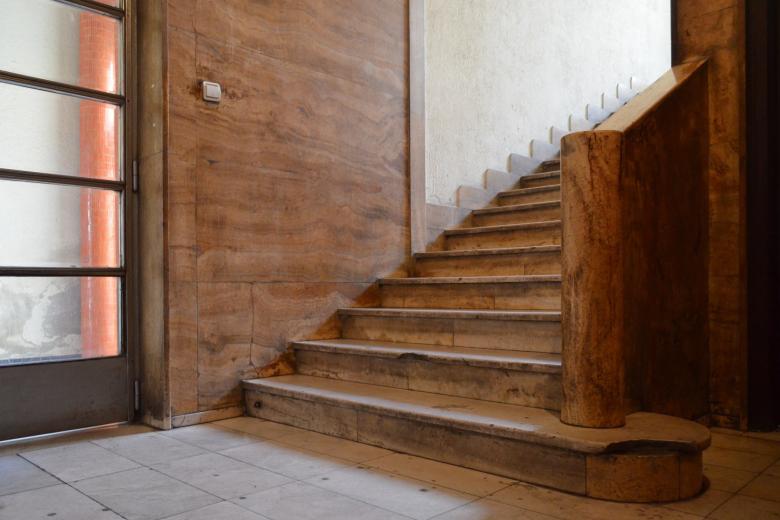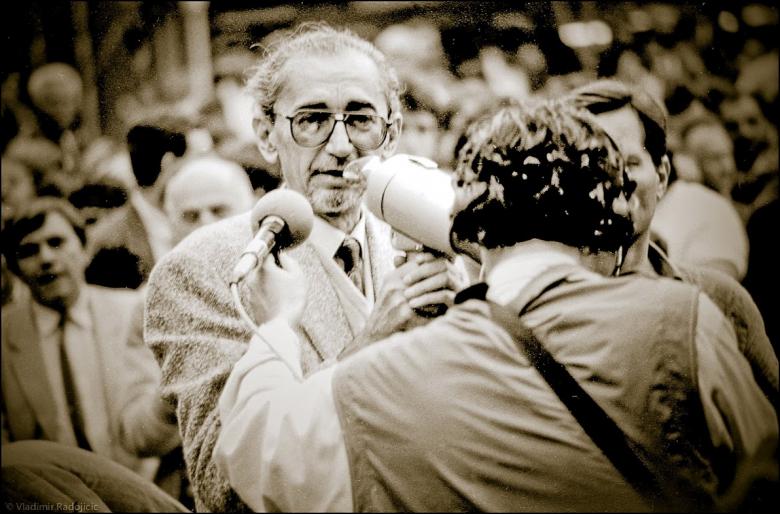6. October 2023
Stairway in a building on Brankova street in Belgrade. (Photo: Virdzinija Djekovic, modified from the original at Wikimedia Commons)
In this latest installment in the “Building Novels” series, which focuses on works of fiction where buildings and architecture play integral roles, Madeline Beach Carey reads Houses, the classic novel by Borislav Pekić that is set in Belgrade and is about a man who has devoted his life and his dreams to building.
The novel Houses is the story of Arsénie Negovan, a bon vivant, Francophile, and visionary who dedicated the first half of his life to building houses. These houses that he gave women’s name are the great loves of his life. These buildings, he believes, have made his hometown of Belgrade a truly modern place — a beautiful city, one to be proud of. He is a most unusual hero in our day and age: a landlord. If the reader closes their eyes and forgets about the current housing crisis, they can enjoy a bit of art for art’s sake and think in these pages just about houses — their dimensions, textures, materials, even their old souls.
This remarkable novel, the second by Borislav Pekić, was first published as Hodočašće Arsenija Njegovana (“The Pilgrimage of Arsenie Negovan”) in 1970, then translated from Serbo-Croatian to English a few years later, as The Houses of Belgrade. The author, one of Yugoslavia’s greatest 20th-century writers, lived in Belgrade from 1945 until his emigration to London in 1971. A staunch anti-communist throughout his life, Pekić was the founding member of Serbia’s Democratic Party during the post-Tito era. In 1992, he died of lung cancer in London. It seems that his great love might have been the city of his youth, which he describes here through the eyes of a semi madman with great care and gentle expertise.
In Houses we read that Negovan began purchasing real estate in 1924, at the time between the wars, when Belgrade was expanding, when building was booming. Because there were no legal provisions for individual ownership of flats, landlords, or rentiers, ruled the roost. But Negovan doesn’t think of himself as an evil speculator. Rather, he wants to possess, to own properties in a prettier, more aesthetically pleasing way; he wants to preserve, to improve, to indulge his buildings, almost like family, like children.
Negovan, our equally wise and infantile narrator, once lived a grand life. He had been a builder. A landlord. A man about town. Yet, the second half of his life had been less romantic, much harder. Ever since World War II and the Nazi occupation he had been hiding in one of his houses. His wife and a nurse looked after him, and on his final day — during which the action of the novel takes place — he sets out to see “his” city.
- Bold Ventures: Thirteen Tales of Architectural Tragedy by Charlotte Van den Broeck
- The Poet & The Architect by Christine Stewart-Nuñez
- The Book of Errors by Annie Coggan
- Love Notes from a German Building Site by Adrian Duncan
For the most part, the novel takes place in the house where Negovan is hiding, on Kosancic Crescent, long the preferred address of Belgrade’s bourgeoise. From here he tells of his great passion: his houses. His eroticism revolves around real estate instead of women:
Houses is also, of course, about politics, the economy, changing geopolitics of the 20th century, and certain vanished worlds. The protagonist’s world, or worldview, has come undone three times. His innocence shattered first in the Russian city of Voronezh, when counterrevolutionaries were removed from their homes and beaten. Then, in 1941, when people protested an alliance with Germany; the third time in 1968, when Negovan leaves the house and slowly, but surely, becomes aware that he is living in a communist country. For twenty-seven years he had lived a fantasy. In reality, all of his properties have been expropriated, but he cannot face such a fate:
Negovan thinks of his houses like men must think of their daughters: sweet, fragile possessions. He looks over models of them:
Arsénie Negovan is delusional. He is, perhaps, a bit innocent and ignorant, thanks to certain pedigrees and privileges, but oh how charming he is. And what a pleasure it is to spend a few hours with him, in his city, in his delusions, in a lost world of beauty and polite pleasures — a vanished world for both the protagonist and for the author. Of course, by 2016, when this novel was reprinted by NYRB Classics, a whole other world had vanished: Communist Yugoslavia. That was the world Pekić couldn’t have known would disappear shortly after his death. Time adds more layers to the novel: other ghosts, new losses.
Borislav Pekić at a demonstration in Belgrade in March 1991. (Photo via Ljiljana Pekić/Wikimedia Commons)
Houses reads as a confession, a last will and testament, but also a map to a man’s vanished, vanishing world. The narrator’s voice is precise, exacting and also purely delusional — an unforgettable voice that any reader would like to stay with a while longer. Negovan is a romantic. He is selfish and yet undeniably pleasant. His life, marked by this great love of houses, provides the reader a palimpsest of the author’s city: the layers of building, the scars left by war and conflict, the beauty of the intricate planning, the decorations of each generation’s hope for renewable. Even while misinterpreting the new reality of communist rule, Negovan’s observations are meticulous and illuminating.
Very few books paint such a precise portrait of individual isolation while describing the historical/external forces of its surroundings: capital, war, revolution. The combination functions almost as a personal dream that we embark upon with Negovan and his houses, a dream that evolves into a nightmarish collective reality.
As his grip on reality crumbles and society changes around him, the reader takes a certain pity on the poor old decadent landlord — and therein Pekić’s genius lies. He makes the reader feel pity toward a landlord, to empathize with the patriarch, and he allows one to also cherish the houses.

Houses
Borislav Pekić
Translated from Serbo-Croatian by Bernard Johnson
Paperback
ISBN 9781590179475
New York Review Books
Purchase this book

